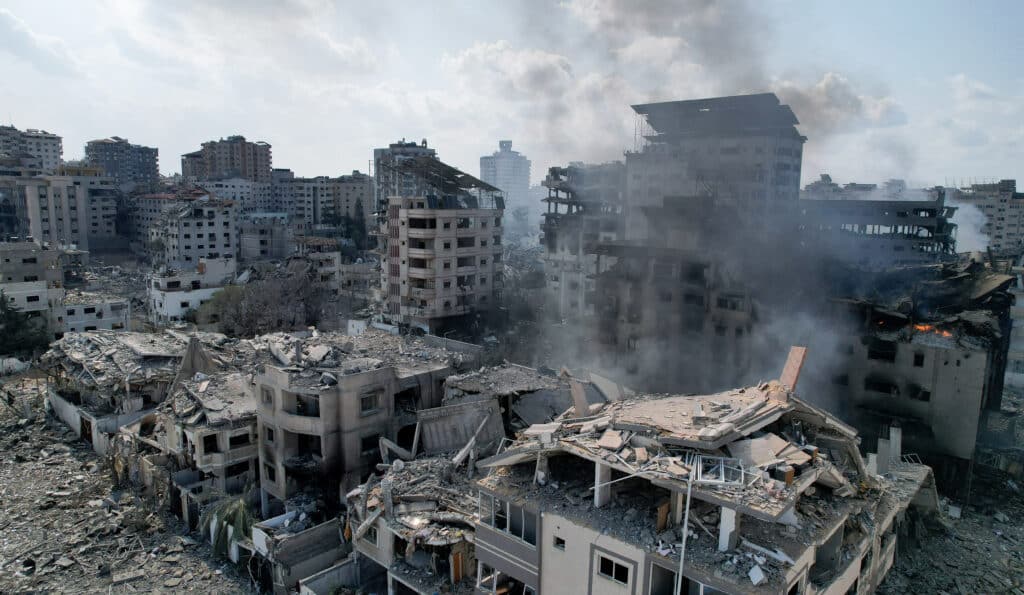Israel said on Tuesday it had reclaimed control of the Gaza border, pounding the enclave with the fiercest air strikes in the 75-year history of its conflict with the Palestinians despite a Hamas threat to execute a captive for each home hit.
Israel has vowed to take its “mighty revenge” since gunmen rampaged through its towns, leaving streets strewn with bodies in by far the deadliest attack in its history. It has called up hundreds of thousands of reservists and placed the Gaza Strip, crowded home to 2.3 million people, under a total siege.
Israeli media said the death toll from the Hamas attacks had climbed to 900 people, mostly civilians gunned down in their homes, on the streets or at a dance party, dwarfing the scale of any past attack by Islamists apart from 9/11. Scores of Israelis were taken to Gaza as hostages, with some paraded through the streets.
Nearly 700 Gazans have since been killed in Israeli strikes, according to Gaza officials, while whole districts in Gaza have been flattened.
The United Nations said 180,000 Gazans had been made homeless, many huddling on streets or in schools. Smoke and flames rose into the morning sky, while bombardment of the roads often made it impossible for emergency crews to reach the scene of strikes.
At the morgue in Gaza’s Khan Younis hospital, bodies were laid on the ground on stretchers with their names written on their bellies. Medics called for relatives to pick up bodies quickly because there was no more space for the dead.
There were heavy casualties in a former municipal building struck while being used as an emergency shelter for displaced families.
“There is an extraordinary number of martyrs, people are still under the rubble, some friends are either martyrs or wounded,” said a Ala Abu Tair, 35, who had sought shelter there with his family after fleeing Abassan Al-Kabira near the border. “No place is safe in Gaza, as you see they hit everywhere.”
NOWHERE TO HIDE
Three Gaza journalists were killed when an Israeli missile hit a building while they were outside reporting. That brought the toll to six journalists killed in Gaza since Saturday.
At one point the Israeli military advised Gaza civilians to flee to Egypt, only to issue a quick clarification confirming that the crossing was closed and there was no way out.
As for Hamas operatives, they had “nowhere to hide in Gaza”, said military spokesperson Rear Admiral Daniel Hagari. “We will reach them everywhere.”
In Israel, there has still been no complete official count of the dead and missing from Saturday’s attacks. In the southern town of Be’eri, where more than 100 bodies have been retrieved, volunteers in yellow vests and face masks solemnly carried the dead out of homes on stretchers.
A long, wide trail of blood wound along the floor of a house where bodies had been dragged out to the street from a bloodsoaked kitchen strewn with overturned furniture.
“The thing I want the most is to wake up from this nightmare,” said Elad Hakim, a survivor from a music festival where Hamas had killed 260 partygoers at dawn. “Everything was so amazing, the best party I’ve been to in my life, until it… from paradise to hell, in one second.”
GROUND OFFENSIVE?
Israel’s next move could be a ground offensive into the Gaza Strip, territory it abandoned in 2005 and has kept under blockade since Hamas took power there in 2007. The total siege it announced on Monday would block even food and fuel from reaching the strip.
Israel was caught so completely off guard by Saturday’s attack that it took more than two days to finally seal off the multi-billion dollar high-tech barrier wall, meant to have been impenetrable.
Military spokesperson Hagari said early on Tuesday there had been no new infiltrations from Gaza since the previous day.
Israeli leaders will now have to decide whether to constrain their retaliation to safeguard the hostages. Hamas spokesperson Abu Ubaida issued the threat on Monday to kill one Israeli captive for every Israeli bombing of a civilian house without warning – and to broadcast the killing.
Saturday’s attacks and Israel’s retaliation tore up the plans of diplomats in the Middle East at a crucial juncture, when Israel was on the verge of reaching an agreement to normalise relations with the richest Arab power, Saudi Arabia.
Western countries have strongly backed Israel. Arab cities have seen street demonstrations in support of the Palestinians. Iran, Hamas’s patron, celebrated the attacks but denied playing a direct role in them.
Supreme Leader Ali Khamenei said on Tuesday that Iran kissed the hands of the planners of the attacks, but that anyone who believed Iran was behind them was mistaken. The attacks had delivered a military and intelligence defeat to Israel that was beyond repair, he said.
A deadly clash on Israel’s northern border on Monday raised fears of a second front in the war, with Iran’s other main ally in the area, Lebanon’s Hezbollah movement, being drawn into the fray. It said it was not behind any incursion into Israel.
The United States’ top general warned Iran not to get involved: “We want to send a pretty strong message. We do not want this to broaden and the idea is for Iran to get that message loud and clear,” General Charles Q. Brown, the chairman of the Joint Chiefs of Staff, told reporters travelling with him to Brussels.

